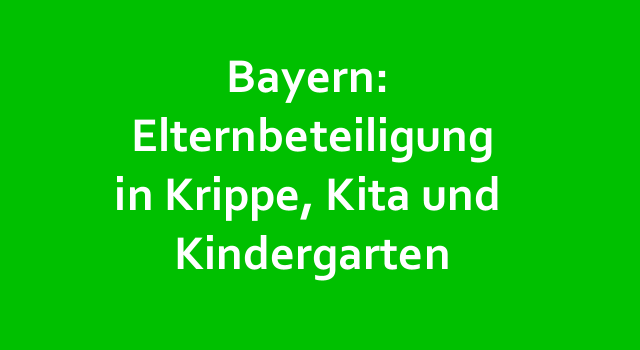Bavaria: Parents’ participation in crèche, daycare and kindergarten

Parental involvement in daycare and after-school care is necessary and strengthens trust in daily care. In Bavaria, parental participation is legal in the BayKiBiG, the Bavarian Law on Education, Upbringing and Care from children in kindergartens, other day care centers and in day care (Bavarian Child Education and Care Act – BayKiBiG).
There, first of all, something very elementary is regulated in Art. 11: namely the required educational partnership between parents and educators or the educational staff. Article 11 (2) states:
"(2) Parents and educational staff work together in partnership in the education, upbringing and care of the children."
The sentence is both a requirement and a requirement.

Both sides can therefore expect each other to work together as partners in the care of the respective child in daycare, kindergarten or after-school care.
Art. 14 BayKiBiG additionally requires that a so-called parents’ council be set up in daycare centers. In detail, it says:
"(1) In order to promote better cooperation between parents, educational staff and sponsors, a parents’ advisory board must be set up in every day care center. If the day care center looks after children from the age of three, the parents’ advisory board should also support cooperation with the primary school.
(2) The parent advisory board is informed and consulted by the management of the day care center and the sponsor before important decisions are made. The parents ‘advisory board advises in particular on the annual planning, the scope of staffing, the planning and organization of regular information and educational events for the parents, the opening and closing times and the determination of the amount of the parents’ contributions.
(3) The educational concept is updated by the sponsor in close coordination with the educational staff and the parents’ council.
(4) Donations collected by the parent advisory council without a specific purpose will be used by the sponsor of the day care center in agreement with the parent advisory board.
(5) The Parents’ Advisory Board must submit an annual report to the parents and the institution. "
The parents’ advisory council should primarily support this. He has the right to information and consultation. He also has an advisory role.
The parents’ council will therefore hardly be able to prevent individual measures. At least not if a daycare or after-school institution observes the formal requirements of Art. 14 BayKiBiG. However, as part of the formal process, a parent’s council can push to be informed and heard before making important decisions. In this context, it will certainly be possible, according to the legal concept, to demand that a carrier seriously consider the opinion of “his” parents’ council.
There is even close coordination when updating the pedagogical concept with the Parents’ advisory council required, although it is unclear whether this means in particular direct approval by the parent’s advisory council. This could be argued against, that the legislature did not use the word "consent", but rather called for a close "vote". This could suggest that the existing pedagogical concept is in most cases part of the contract content of a care relationship and therefore cannot be changed so easily unilaterally.
However, the last point applies in particular in the relationship between the individual parents and the provider as parties to the respective care relationship.
Therefore, we tend to negate a consent requirement in the sense of a right of refusal on the part of the parents’ council. It is not really apparent that the legislature really wanted to give the parents’ council such a sharp right.
Regardless, it would also be completely unclear what should happen legally if the parents’ council should not give its approval. Could the parents’ council be sued for consent? Or to put it another way: Would the parent’s advisory board have a legally enforceable right to injunctive relief if the institution should act without the consent of the parent’s advisory board? Both would be very questionable.
The same problem otherwise arises in the implementation of Art. 14 Para. 4 BayKiBiG. Because here is the "sharp sword" for the parents’ advisory board. Because donations handed over to the parent’s advisory board without a specific purpose may only be used “in agreement” with the parent’s advisory board.
At this point, everyone has to agree.
You have questions about kite law?
Just give us a call for a no-obligation, free preliminary consultation! We look forward to your non-binding inquiry.
Follow us on:
RELATED ITEMS
-

Daycare workers and data protection – what should the provider consider? If you think about data protection in day-to-day nursery life, the educators, cook, are…
-

Only in bavaria: family allowance
Most family benefits – such as B. Child benefit – there is nationwide. In addition, and only in Bavaria is there family benefit. With the…
-

Child labor in Bavaria in the 19th
Brick workers in Bavaria around 1900. Photo: Heimatmuseum Vilsbiburg Maxvorstadt · On the occasion of World Children’s Day, on Tuesday, September 24, at 2 p.m….
-

Adidas kids pro fc bayern münchen goalkeeper gloves, fcbtru
Football equipment ADILJ | #adidas CW5621 – Brand: Adidas. Adidas performance FC BAYERN. Goalkeeper gloves for youth football; supports the…
